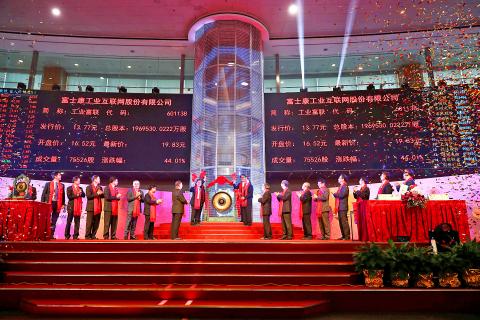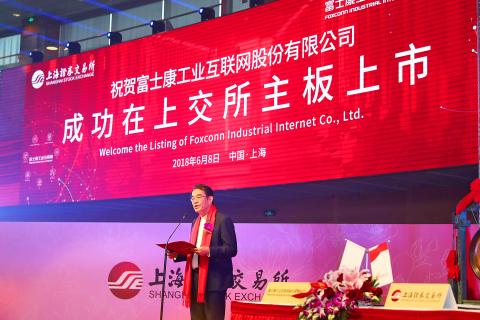Foxconn Industrial Internet Co Ltd (FII, 富士康工業互聯網), a unit of the world’s largest contract manufacturer, yesterday became China’s biggest domestically listed tech company by market cap as its shares soared by the maximum 44 percent on their debut on the Shanghai Stock Exchange.
The China based Internet subsidiary of Hon Hai Precision Industry Co (鴻海精密) opened about 20 percent higher than the initial public offering (IPO) price of 13.77 yuan at 16.52 yuan, quickly climbing to 19.83 yuan.
With its strong start, FII saw its market capitalization rise from 271.2 billion yuan (US$42.3 billion) to more than 390.5 billion yuan, edging out video surveillance product supplier Hangzhou Hikvision Digital Technology Co (杭州海康威視數字技術) as the tech stock with the largest market cap among yuan-denominated A-shares listed in Shanghai and Shenzhen.

Photo: Reuters
Investors have been upbeat about FII’s future movement on the Shanghai Stock Exchange, anticipating that its market value would continue to increase, dealers said.
The optimism is based in part on FII’s strategic partnership with a group of Chinese business heavyweights to which it has issued new shares, dealers said.
The strategic partners include e-commerce giant Alibaba Group Holding Ltd (阿里巴巴), search engine Baidu Inc (百度) and online services provider Tencent Holdings Ltd (騰訊).

Photo: Reuters
FII’s listing is part of an effort by Hon Hai, known globally as Foxconn Technology Group (富士康), to integrate hardware production with software development capabilities, such as for cloud computing, Internet of Things, big data and artificial intelligence, with its contract electronics operations to expand beyond manufacturing.
FII’s IPO raised 27.12 billion yuan, which Hon Hai said is to be used for investment in its new software-based areas of interest in China.
On Thursday, FII reported a 19.78 percent year-on-year increase in consolidated sales in the first quarter of the year to 77.69 billion yuan and a 1 percent rise in profit from a year earlier to 2.63 billion yuan.
FII has forecast consolidated sales of between 146.06 billion yuan and 154.58 billion yuan for the first half of the year, a 6.8 to 13.1 percent year-on-year increase.
It has also projected a first-half net profit of between 5.35 billion yuan and 5.56 billion yuan, an increase of 0.6 to 4.5 percent from a year earlier.
After the IPO, Hon Hai retains an 84.8 percent stake in FII, which has serves global heavyweights such as Amazon.com Inc, Apple Inc, Dell Inc, Aris International PLC, Huawei Technologies Co (華為) and Lenovo Group Ltd (聯想).

DIVIDED VIEWS: Although the Fed agreed on holding rates steady, some officials see no rate cuts for this year, while 10 policymakers foresee two or more cuts There are a lot of unknowns about the outlook for the economy and interest rates, but US Federal Reserve Chair Jerome Powell signaled at least one thing seems certain: Higher prices are coming. Fed policymakers voted unanimously to hold interest rates steady at a range of 4.25 percent to 4.50 percent for a fourth straight meeting on Wednesday, as they await clarity on whether tariffs would leave a one-time or more lasting mark on inflation. Powell said it is still unclear how much of the bill would fall on the shoulders of consumers, but he expects to learn more about tariffs

Meta Platforms Inc offered US$100 million bonuses to OpenAI employees in an unsuccessful bid to poach the ChatGPT maker’s talent and strengthen its own generative artificial intelligence (AI) teams, OpenAI CEO Sam Altman has said. Facebook’s parent company — a competitor of OpenAI — also offered “giant” annual salaries exceeding US$100 million to OpenAI staffers, Altman said in an interview on the Uncapped with Jack Altman podcast released on Tuesday. “It is crazy,” Sam Altman told his brother Jack in the interview. “I’m really happy that at least so far none of our best people have decided to take them

PLANS: MSI is also planning to upgrade its service center in the Netherlands Micro-Star International Co (MSI, 微星) yesterday said it plans to set up a server assembly line at its Poland service center this year at the earliest. The computer and peripherals manufacturer expects that the new server assembly line would shorten transportation times in shipments to European countries, a company spokesperson told the Taipei Times by telephone. MSI manufactures motherboards, graphics cards, notebook computers, servers, optical storage devices and communication devices. The company operates plants in Taiwan and China, and runs a global network of service centers. The company is also considering upgrading its service center in the Netherlands into a

NOT JUSTIFIED: The bank’s governor said there would only be a rate cut if inflation falls below 1.5% and economic conditions deteriorate, which have not been detected The central bank yesterday kept its key interest rates unchanged for a fifth consecutive quarter, aligning with market expectations, while slightly lowering its inflation outlook amid signs of cooling price pressures. The move came after the US Federal Reserve held rates steady overnight, despite pressure from US President Donald Trump to cut borrowing costs. Central bank board members unanimously voted to maintain the discount rate at 2 percent, the secured loan rate at 2.375 percent and the overnight lending rate at 4.25 percent. “We consider the policy decision appropriate, although it suggests tightening leaning after factoring in slackening inflation and stable GDP growth,”